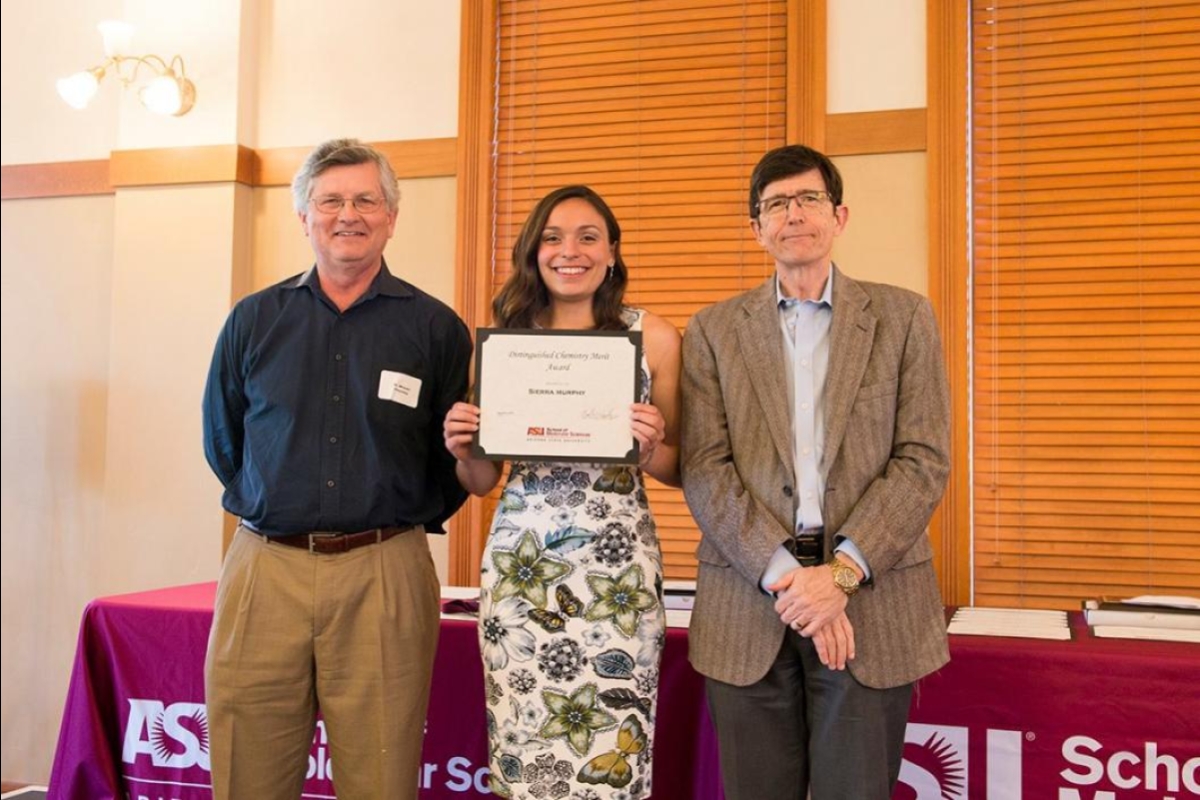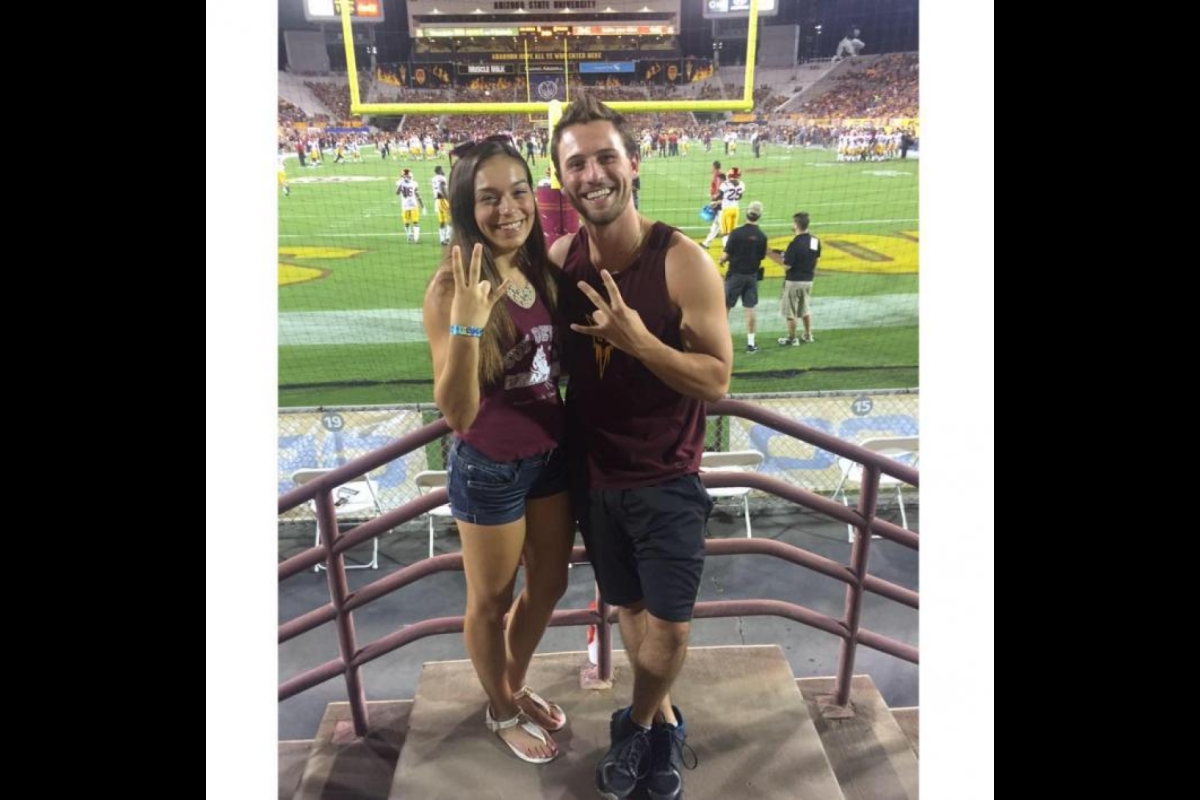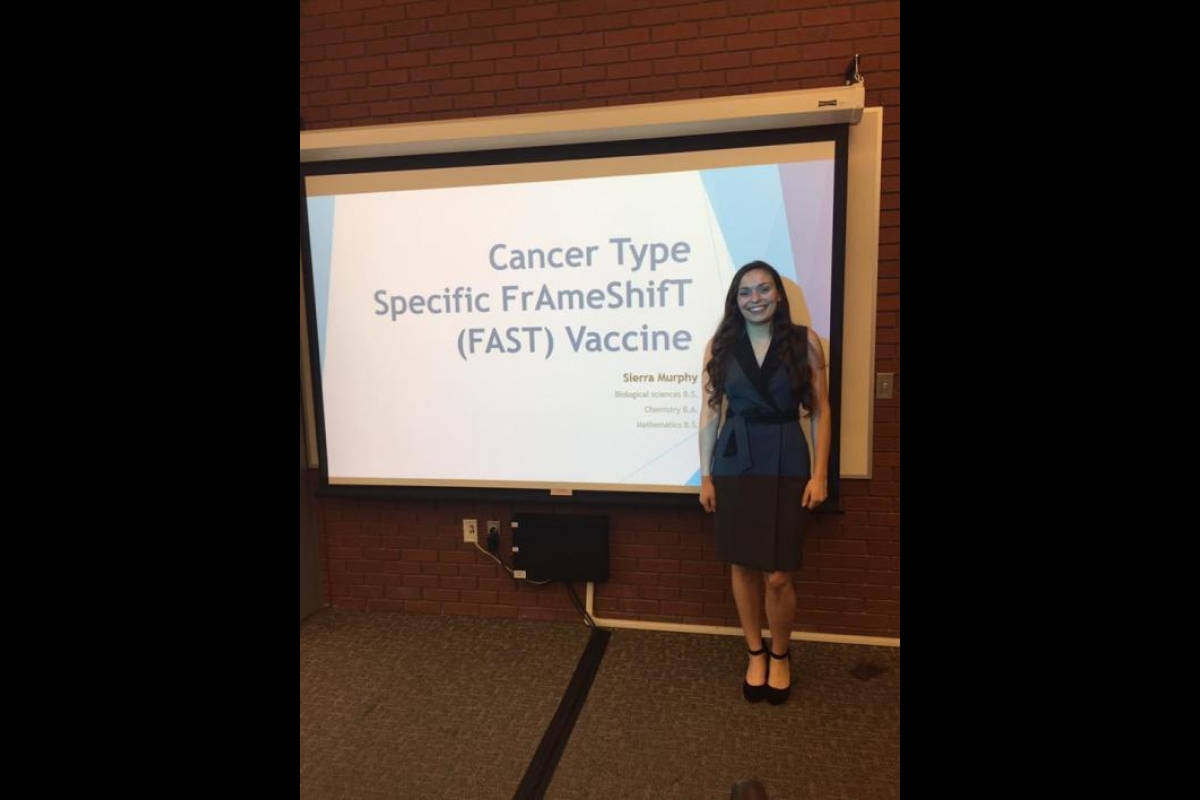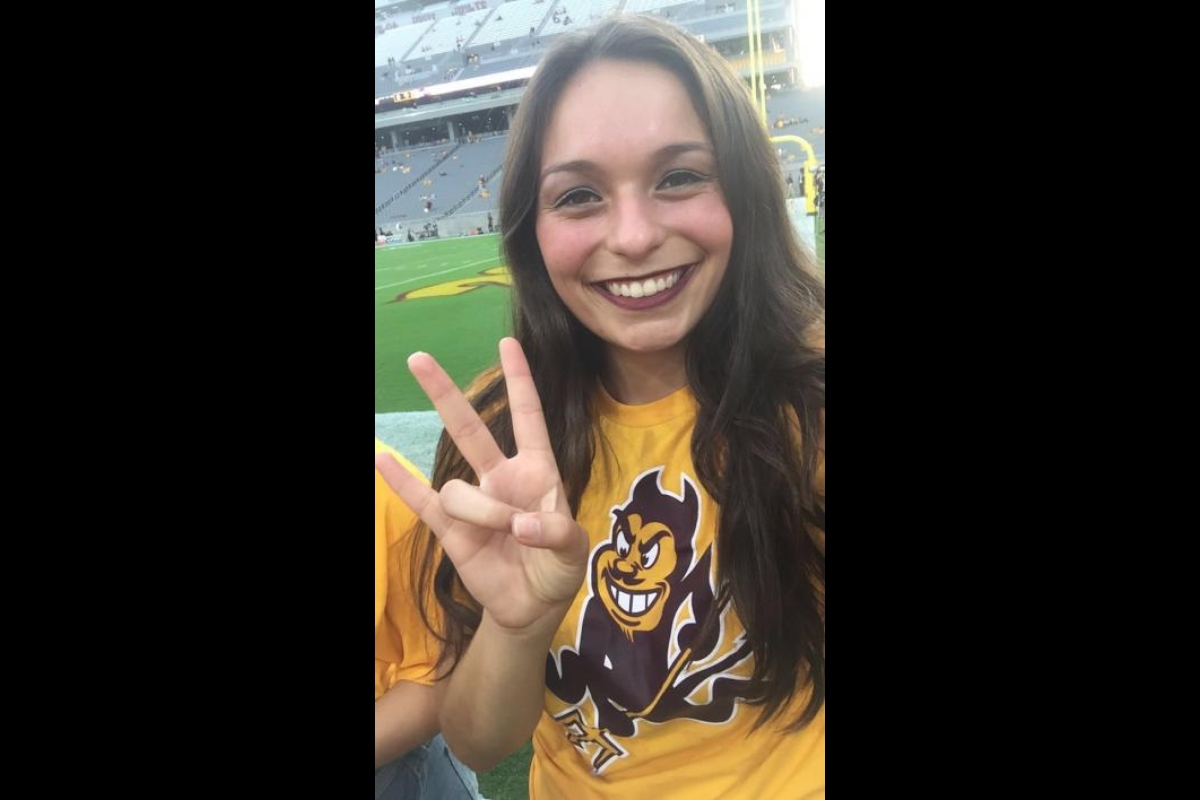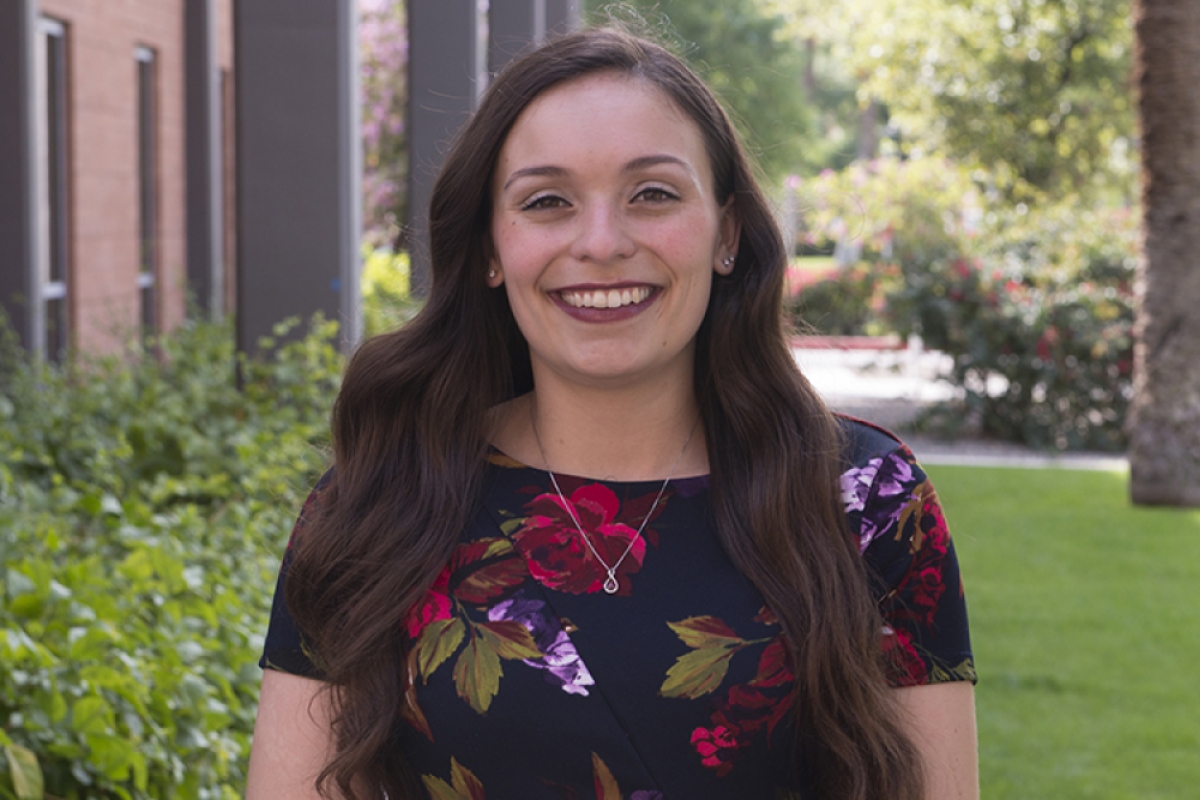Graduate's passion for science and math earns a triple degree — by accident
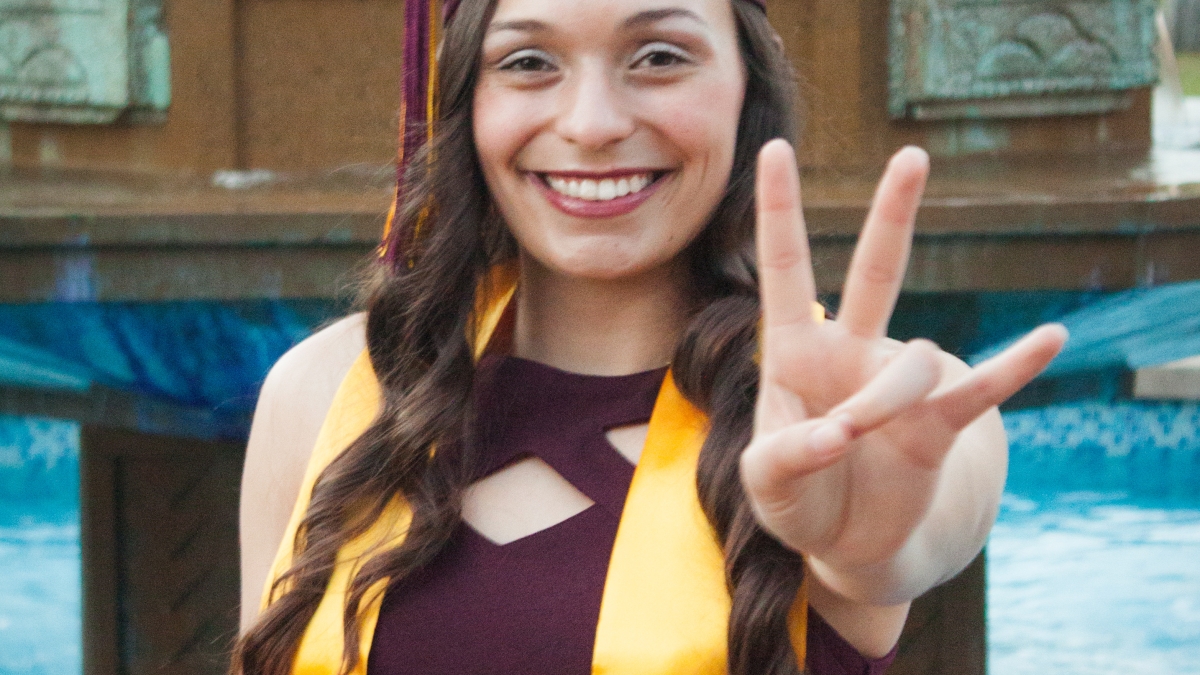
Sierra Murphy
Editor’s note: This is part of a series of profiles for spring 2019 commencement.
Sierra Murphy will be graduating in May with not one bachelor’s degree in STEM from Arizona State University, but three — a BS in biology, a BS in mathematics and a BA in chemistry, all by accident.
When Murphy enrolled at ASU she was a biology major with her sights set on going to medical school. But it wasn’t long after that she found herself missing math and problem-solving challenges, thus adding on a minor in mathematics, which quickly became her second major. Murphy then took “O” chem and loved it. After her first semester, she decided to add it on as minor, but found out she didn’t need much more to make it a major, so by happenstance she found herself with three STEM majors.
Murphy said she recalls calling her mom to tell her that she just added on another major and was thinking about how she would balance it all. What she found was that they complemented each other and the balancing part wasn’t difficult: When she needed a break from one area, she was able to focus on another and use each one to its advantage for problem-solving.
When Murphy — a first-generation student, a National Hispanic scholar and a female in STEM — arrived in Tempe, she quickly became involved and took advantage of the opportunities ASU had to offer.
Murphy sees herself in a leadership role and works as a peer mentor with undergraduate students in the ASU Disability Resource Center as a residential assistant at Barrett, The Honors College. She wants to impact those around her and encourages others to pursue their goals and to become leaders themselves.
“You don’t realize how many people you affect in a day,” said Murphy.
Her older brother, Hunter Murphy, is an ASU alumnus and her best friend. Hunter decided to go to Barrett, The Honors College and two years later Sierra followed in his footsteps. Sierra credits her brother as a great role model, instilling in her a strong work ethic and pushing her to reach her goals. She shared that she loved going to university with her brother and was grateful to have had the opportunity. Together, as first-generation students, they started a strong Sun Devil tradition in their family.
“I am beyond proud of my sister’s accomplishments; with her work ethic, I truly believe her future is limitless,” said Hunter Murphy. “I know we were both meant to be Sun Devils!”
As an undergraduate, Murphy has been a research assistant in the lab of Stephen A. Johnston, director of the Center for Innovations in Medicine. In that lab, she had a large role in the development, implementation and analysis of a breast cancer vaccine. Murphy also was a hospice volunteer and premedical scholar with Mayo Clinic.
Murphy has been recognized with three graduation awards — Dean’s Medalist for the School of Life Sciences and the Outstanding Graduate for The College of Liberal Arts and Sciences — Natural Science Division, and the Distinguished Chemistry Merit Award from the School of Molecular Sciences.
“Sierra is a person who knows who she is and what she wants to accomplish. She is combining the skills that she has obtained from three separate and simultaneous bachelor degrees in chemistry, biomedical sciences and mathematics, to position herself to first train in medicine and medical research and then address significant problems in health and science,” said Professor William Petuskey of the School of Molecular Sciences. “She is a person who is concerned about the well-being of others. You can see this in her work as a mentor for disabled students, a residential assistant for younger undergraduate students, as a pre-medical intern at Phoenix Children's Hospital and Mayo Clinic, a patient ambassador at the Banner University Medical Center, and in conducting research on innovative new approaches to creating new personalized cancer vaccines.”
Murphy will be continuing on with her research after graduation and is applying to medical school. She answered some questions about her time at ASU.
Q: If you received a scholarship, how did it impact your education at ASU?
A: I am a National Hispanic Scholar. I am very thankful for this scholarship because it has given me the incredible opportunity to graduate debt free. This has impacted my education because it allowed me to focus on my studies, though I did have two jobs during undergrad as a community assistant and a research aide.
Q: What was your “aha” moment, when you realized you wanted to study the field you majored in?
A: My passion for biology probably began with the first time I learned about cells. Since then, that passion has only grown and been reaffirmed by my research and clinical experiences. I am researching cancer vaccines at the ASU Biodesign Institute and have participated in programs and internships at Banner University Medical Center, Mayo Clinic and Phoenix Children’s Hospital. Furthermore, my favorite class subject was immunology.
My passion for mathematics developed long after I realized I was good at it. I had skipped pre-algebra in middle school and definitely liked my math classes, but when I took precalculus with Cathy Gonzalez, she inspired me to really challenge myself in math. At this point, I enjoyed math and graduated high school having taken Calculus I, II and III as well as Statistics. After a semester at ASU, I missed problem-solving and added mathematics as a second major.
My passion for chemistry was undeniable after taking Organic Chemistry at ASU. I knew I wanted to learn more about molecules so a class turned into a minor turned into a major.
Q: What’s something you learned while at ASU — in the classroom or otherwise — that surprised you or changed your perspective?
A: I learned that I love research. I was surprised that research has had such an impact on me and has been one of the best decisions I made at ASU. Research has fueled my passion for medicine as well as complemented it. I had a strict idea of what it meant to be a doctor, but now that definition includes innovating solutions, too.
Q: Why did you choose ASU?
A: ASU has provided me with all the opportunities of a large public university and the individual attention of the honors college. I was able to build my own path at ASU as well as shape my resume to tell a story of my interests.
Q: Which professor taught you the most important lesson while at ASU?
A: Dr. Ben Hurlbut was my bioethics teacher. I met with him throughout the semester as part of my honors contract. This was individual time that I valued. Two years later I met with Dr. Hurlbut again to ask for a letter of recommendation to medical school. During this conversation, Dr. Hurlbut complimented me on my authenticity and genuine passion for my studies. He then went on to nominate me for the Dean's Medal for SOLS, which I was later awarded. This day had a profound impact on me because it validated all my hard work and made me truly look at who I had developed into over the years. The lesson I learned from this is to be fearlessly myself and stay true to my beliefs. You never know who is watching or what kind of impact you make and I am so grateful to know that who I am was seen so positively.
Q: What’s the best piece of advice you’d give to those still in school?
A: I want others to pursue their interests with confidence. If I had listened to any of the people that had told me I wasn’t capable of being successful in the STEM field or balancing all the activities I did … then I wouldn’t be who I am today. By pursuing the triple major and research and clinical experiences and leadership roles, I have learned so much about myself. I am so fulfilled and proud of where I am today and how I have pushed my limits. I am proud that I accomplished all of this while staying happy and healthy. I want that for others. Each opportunity is an opportunity to learn more about what drives you.
Q: What was your favorite spot on campus, whether for studying, meeting friends or just thinking about life?
A: I would have to say outside the Student Pavilion with the palm trees and the string lights. It is a beautiful sight at night, and because I have a dog, I often walked by it at night.
Q: What are your plans after graduation?
A: After graduation, I will apply to medical school and continue with my cancer vaccine research for a year. Then, I will attend medical school to become a surgeon.
Q: If someone gave you $40 million to solve one problem on our planet, what would you tackle?
A: I would definitely focus on public health. I would pursue my current research on cancer vaccines and extend it to more human cancers, as we hope to do. I would also like to find a way to return trust in the general vaccines that build immunity against infectious diseases. Also, I would want to campaign to increase registered organ donors.
More Science and technology

ASU-led space telescope is ready to fly
The Star Planet Activity Research CubeSat, or SPARCS, a small space telescope that will monitor the flares and sunspot activity…

ASU at the heart of the state's revitalized microelectronics industry
A stronger local economy, more reliable technology, and a future where our computers and devices do the impossible: that’s the…

Breakthrough copper alloy achieves unprecedented high-temperature performance
A team of researchers from Arizona State University, the U.S. Army Research Laboratory, Lehigh University and Louisiana State…


